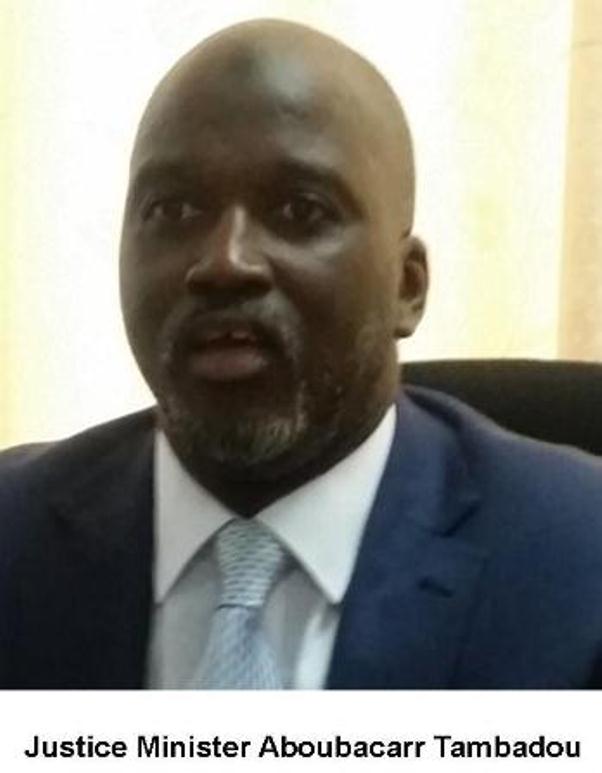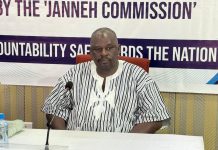By Kebba AF Touray
The role of the Attorney General in the prolonged receivership of companies associated with former President Yahya A.J.J. Jammeh came under scrutiny on Monday as Louis Prom, advisory partner of the Augustus Prom firm, testified before the National Assembly’s special select committee investigating the sale and disposal of Jammeh’s assets.
Mr. Prom, who was involved in managing the seized assets, told lawmakers that although the firm initially operated under a six-month mandate, the Attorney General persistently returned to the High Court for extensions, resulting in the receivership lasting from May 2017 to June 2019. “The Attorney General kept going before the expiry or at the end of the 180 days to go back to the High Court and renew, and this kept going on from May 2017 to June 2019. So, two years,” committee member Hon. Fatoumatta Njai (Kah) remarked.
When asked whether the firm had engaged the Attorney General regarding the stocks and bonds of the companies, Mr. Prom explained that the receivership was grounded in the conclusions of the Janneh Commission, and they operated on standby. “That means we cannot do long-term decisions,” he said. “If the assets are very valuable and technical, like the gold dust refinery, the container scanner, it was better just to secure it.”
He noted that despite having legal authority to sell certain assets, such as D5 million in stocks held by KGI, the firm opted against it. “As far as sales are concerned, our mandate was focused on management, not sales,” he said. “This is about a sovereign asset, and we were very careful as well not to do something that tomorrow could backfire on us.”
Mr. Prom also disclosed that the firm once raised concerns directly with the Attorney General, but “he wasn’t too helpful, because he was making a lot of fuss about fees, legal fees.” In response, Prom’s firm suggested the use of the National Agency for Legal Aid.
On the companies themselves, Mr. Prom stated that the majority were in financial distress. “The total debts was almost a billion dollars for all these companies — D933 million,” he said. “Half of that was on investigations at the High Court.”
He clarified that most of the companies had short-term debts, known as payables, which were difficult to service due to weak cash flows. “We try to bring down the payables in terms of its debts, like utilities, taxes,” he said, but added that “long-term liabilities, the companies were not financially strong at that point to cover debts, especially heavy debts.”
Speaking about specific properties, Mr. Prom mentioned two warehouses at the Banjul International Airport that were taken over by Westwood Limited, a timber company, and MCT, a mineral company involved in gold dust refining. “Because of the equipment, we just secured it,” he said. “We took no steps to bring it into operation.”
He added that they took photographs and inventories of the equipment and operated with caution. “We were operating on a six-month mandate,” he said, “but we didn’t expect it to go for six years.”
On Observer newspaper, Prom said the company was insolvent. “We took over Observer based on an order, but we found it indebted to D20 million. It had a claim from GRA for D17 million, which was already ongoing,” he said. “As a result, GRA closed the company via the sheriff.”
He noted that the firm had limited time and could not conduct due diligence. “I believe we managed it for a few weeks,” he told the committee.
Mr. Prom also discussed the Abuko Abattoir, describing it as difficult to manage due to its national importance and interaction with various groups. “Nevertheless, it was stabilized, and salaries were being paid,” he said. However, he noted that “the legal status of the abattoir, it wasn’t defined.”
On financial challenges, he said: “It was about D100,000 or so, but based on the cash flow… you’re going to go and get loans if you’re a company in receivership.” He said they consulted the Ministry of Agriculture about possible grants to upgrade the facility.
Regarding NAWEC’s D53 million claim against KGI and Kanilai Farms, Mr. Prom said the utility provider never pursued litigation but wrote to them. “So what we did when we took over, the current bills, that’s what we paid moving forward in terms of what the companies could afford,” he said. “But there were too many claims.”
Throughout the testimony, Mr. Prom emphasized the challenges of managing the firms under legal and logistical constraints and noted that the firm’s cautious approach stemmed from the sensitive nature of the assets.



















